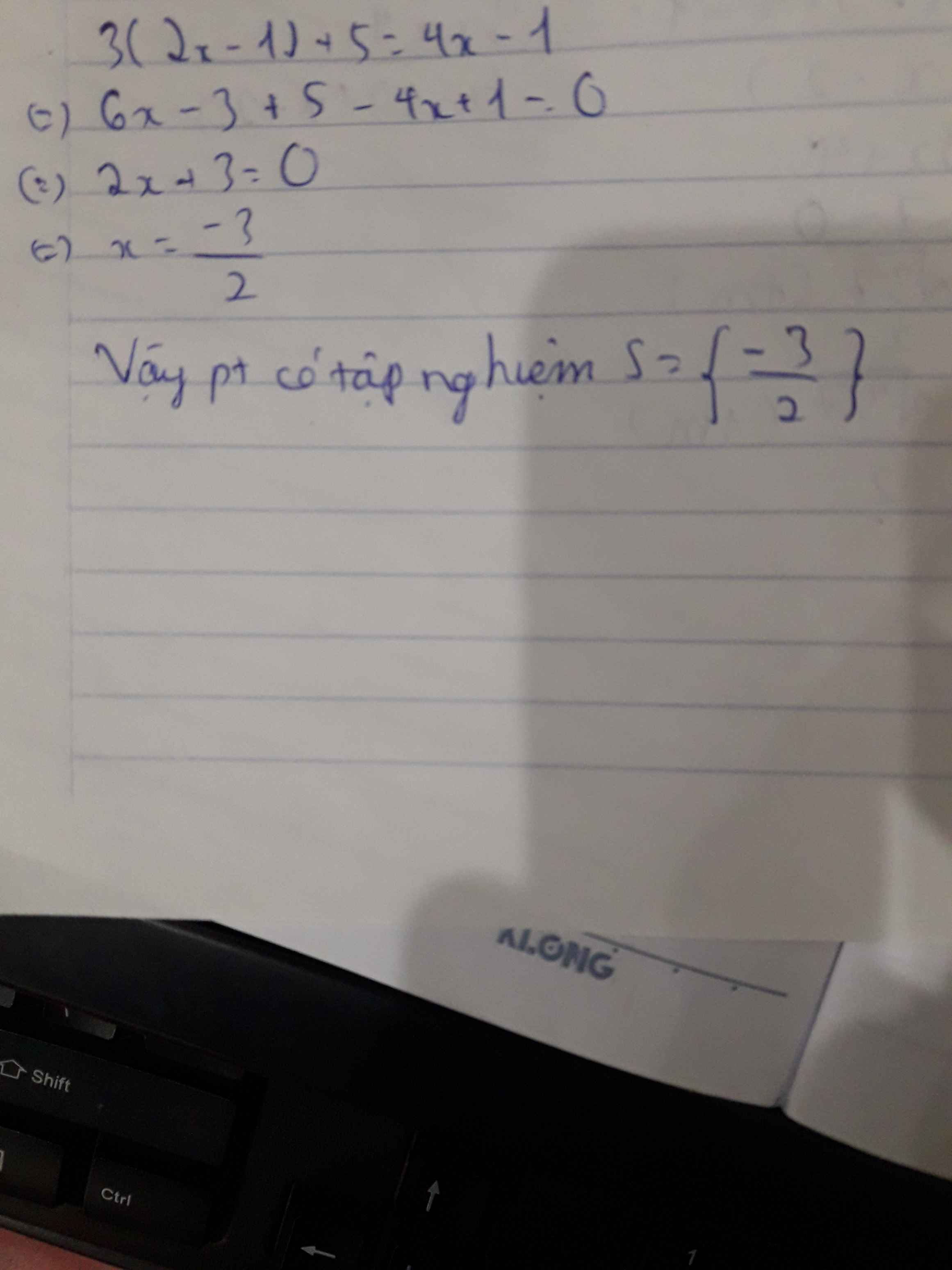
Hãy nhập câu hỏi của bạn vào đây, nếu là tài khoản VIP, bạn sẽ được ưu tiên trả lời.


\(3,x^3-4x=0\)
\(x\left(x^2-4\right)=0\)
\(\left(x-2\right)x\left(x+2\right)=0\)
\(\Leftrightarrow\left[{}\begin{matrix}x=-2\\x=0\\x=2\end{matrix}\right.\)
\(4,4x-3\left(x-2\right)=7-x\)
\(4x-3x+6=7-x\)
\(x+6=7-x\)
\(2x=1\)
\(x=\dfrac{1}{2}\)
\(3\Leftrightarrow\left[{}\begin{matrix}x=0\\x=2\\x=-2\end{matrix}\right.\)
4 \(\Leftrightarrow4x-3x+6-7+x=0\Leftrightarrow x=\dfrac{1}{2}\)


\(3\left(x-2\right)-4x+5=2\left(2x+1\right)-18\\ \Leftrightarrow3x-6-4x+5=4x+2-18\\ \Leftrightarrow-x-1=4x-16\\ \Leftrightarrow-x-4x=-16+1\\ \Leftrightarrow-5x=-15\\ \Leftrightarrow x=3\)

thỏ_con
Ko biết thì nói làm gì bạn
Công nhận bạn rảnh dễ sợ luôn
@@@

a) \(2\chi-3=3\left(\chi+1\right)\)
\(\Leftrightarrow2\chi-3=3\chi+3\)
\(\Leftrightarrow2\chi-3\chi=3+3\)
\(\Leftrightarrow\chi=-6\)
Vậy phương trình có tập nghiệm S= \(\left\{-6\right\}\)
\(3\chi-3=2\left(\chi+1\right)\)
\(\Leftrightarrow3\chi-3=2\chi+2\)
\(\Leftrightarrow3\chi-2\chi=2+3\)
\(\Leftrightarrow\chi=5\)
Vậy phương trình có tập nghiệm S= \(\left\{5\right\}\)
b) \(\left(3\chi+2\right)\left(4\chi-5\right)=0\)
\(\Leftrightarrow\left[{}\begin{matrix}3\chi+2=0\\4\chi-5=0\end{matrix}\right.\)
\(\Leftrightarrow\left[{}\begin{matrix}3\chi=-2\\4\chi=5\end{matrix}\right.\)
\(\Leftrightarrow\left[{}\begin{matrix}\chi=\dfrac{-2}{3}\\\chi=\dfrac{5}{4}\end{matrix}\right.\)
Vậy phương trình có tập nghiệm S= \(\left\{\dfrac{-2}{3};\dfrac{5}{4}\right\}\)
\(\left(3\chi+5\right)\left(4\chi-2\right)=0\)
\(\Leftrightarrow\left[{}\begin{matrix}3\chi+5=0\\4\chi-2=0\end{matrix}\right.\)
\(\Leftrightarrow\left[{}\begin{matrix}3\chi=-5\\4\chi=2\end{matrix}\right.\)
\(\Leftrightarrow\left[{}\begin{matrix}\chi=\dfrac{-5}{3}\\\chi=\dfrac{1}{2}\end{matrix}\right.\)
Vậy phương trình có tập nghiệm S= \(\left\{\dfrac{-5}{3};\dfrac{1}{2}\right\}\)
c) \(\left|\chi-7\right|=2\chi+3\)
Trường hợp 1:
Nếu \(\chi-7\ge0\Leftrightarrow\chi\ge7\)
Khi đó:\(\left|\chi-7\right|=2\chi+3\)
\(\Leftrightarrow\chi-7=2\chi+3\)
\(\Leftrightarrow\chi-2\chi=3+7\)
\(\Leftrightarrow\chi=-10\) (KTMĐK)
Trường hợp 2:
Nếu \(\chi-7\le0\Leftrightarrow\chi\le7\)
Khi đó: \(\left|\chi-7\right|=2\chi+3\)
\(\Leftrightarrow-\chi+7=2\chi+3\)
\(\Leftrightarrow-\chi-2\chi=3-7\)
\(\Leftrightarrow-3\chi=-4\)
\(\Leftrightarrow\chi=\dfrac{4}{3}\)(TMĐK)
Vậy phương trình có tập nghiệm S=\(\left\{\dfrac{4}{3}\right\}\)
\(\left|\chi-4\right|=5-3\chi\)
Trường hợp 1:
Nếu \(\chi-4\ge0\Leftrightarrow\chi\ge4\)
Khi đó: \(\left|\chi-4\right|=5-3\chi\)
\(\Leftrightarrow\chi-4=5-3\chi\)
\(\Leftrightarrow\chi+3\chi=5+4\)
\(\Leftrightarrow4\chi=9\)
\(\Leftrightarrow\chi=\dfrac{9}{4}\)(KTMĐK)
Trường hợp 2: Nếu \(\chi-4\le0\Leftrightarrow\chi\le4\)
Khi đó: \(\left|\chi-4\right|=5-3\chi\)
\(\Leftrightarrow-\chi+4=5-3\chi\)
\(\Leftrightarrow-\chi+3\chi=5-4\)
\(\Leftrightarrow2\chi=1\)
\(\Leftrightarrow\chi=\dfrac{1}{2}\)(TMĐK)
Vậy phương trình có tập nghiệm S=\(\left\{\dfrac{1}{2}\right\}\)

3, đk : x =< 3/5
TH1 : \(x-2=3-5x\Leftrightarrow6x=5\Leftrightarrow x=\dfrac{5}{6}\)(ktm)
TH2 : \(x-2=5x-3\Leftrightarrow4x=1\Leftrightarrow x=\dfrac{1}{4}\)(tm)
4, \(\Leftrightarrow8x-14=3x+21\Leftrightarrow5x=35\Leftrightarrow x=7\)
Bài 3:
\(\Leftrightarrow x-2=3-5x\\ \Leftrightarrow x+5x=3+2\\ \Leftrightarrow6x=5\\ \Leftrightarrow x=\dfrac{5}{6}\)
Vậy \(x=\dfrac{5}{6}\)
Bài 4:
\(\Leftrightarrow8x-14=3x+3+18\)
\(\Leftrightarrow8x-3x=3+18+14\\ \Leftrightarrow5x=35\\ \Leftrightarrow x=\dfrac{35}{5}=7\)
Vậy x = 7